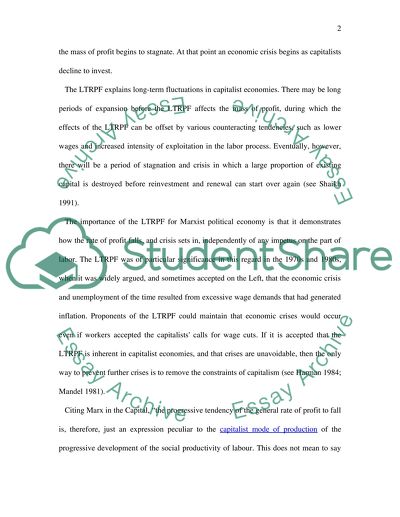Cite this document
(Marx and Ricardo's Concepts of Movement of Rate of Profit Literature review - 1, n.d.)
Marx and Ricardo's Concepts of Movement of Rate of Profit Literature review - 1. Retrieved from https://studentshare.org/macro-microeconomics/1542552-ricardo-and-marx-both-had-theories-of-a-falling-tendency-of-the-rate-of-profit-in-the-development-of-capitalism-what-were-the-different-theoretical-bases-for-t
Marx and Ricardo's Concepts of Movement of Rate of Profit Literature review - 1. Retrieved from https://studentshare.org/macro-microeconomics/1542552-ricardo-and-marx-both-had-theories-of-a-falling-tendency-of-the-rate-of-profit-in-the-development-of-capitalism-what-were-the-different-theoretical-bases-for-t
(Marx and Ricardo'S Concepts of Movement of Rate of Profit Literature Review - 1)
Marx and Ricardo'S Concepts of Movement of Rate of Profit Literature Review - 1. https://studentshare.org/macro-microeconomics/1542552-ricardo-and-marx-both-had-theories-of-a-falling-tendency-of-the-rate-of-profit-in-the-development-of-capitalism-what-were-the-different-theoretical-bases-for-t.
Marx and Ricardo'S Concepts of Movement of Rate of Profit Literature Review - 1. https://studentshare.org/macro-microeconomics/1542552-ricardo-and-marx-both-had-theories-of-a-falling-tendency-of-the-rate-of-profit-in-the-development-of-capitalism-what-were-the-different-theoretical-bases-for-t.
“Marx and Ricardo'S Concepts of Movement of Rate of Profit Literature Review - 1”. https://studentshare.org/macro-microeconomics/1542552-ricardo-and-marx-both-had-theories-of-a-falling-tendency-of-the-rate-of-profit-in-the-development-of-capitalism-what-were-the-different-theoretical-bases-for-t.


